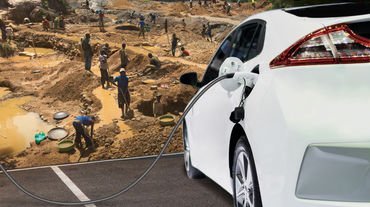The dark side of Tesla: gigafactories need gigamines
 Nickel industry wastewater and tailings pollute the ocean off Sulawesi (© Jatam Sulteng)
Nickel industry wastewater and tailings pollute the ocean off Sulawesi (© Jatam Sulteng)
Oct 9, 2020
The production of electric vehicles requires vast amounts of raw materials such as nickel: Around 32 kg of this metal are needed for the lithium batteries of a mid-range car. To secure access, Tesla CEO Elon Musk is encouraging global nickel mining and is considering investing in the mining industry in Indonesia and elsewhere.
“Any mining companies out there ... wherever you are in the world, please mine more nickel,” was the urgent appeal to the mining industry by Elon Musk, CEO of Tesla, a US manufacturer of electric cars. “Tesla will give you a giant contract for a long period of time if you mine nickel efficiently and in an environmentally sensitive way,” he added.
Huge quantities of metals and other raw materials are needed to build Tesla’s electric vehicles. Tesla is in early talks with the government of Indonesia about a possible investment in the nickel industry, Reuters reports. The Southeast Asian country is one of the world’s largest nickel producers.
In the rainforests of the islands of Sulawesi and Wawonii, nickel is already being mined by Chinese companies, as well as Vale, a Brazilian mining company – with catastrophic consequences for the environment and the people who live there. Ecosystems of great biodiversity are being destroyed, rivers and coastal waters rich in marine life are being polluted, and people are being displaced and poisoned. Nickel mine operators have applied to the Indonesian government for permission to dump the tailings, which are corrosive and laden with heavy metals, in the sea.
Earlier this year, Indonesia stopped exporting unprocessed nickel – not for environmental reasons, but for purely economic considerations: to encourage investments in the nickel industry and the domestic production of lithium batteries.
In September, the Indonesian government announced a contract to build a lithium battery factory with South Korea’s LG Chem and China’s Contemporary Amperex Technology Ltd (CATL), the global leaders in battery manufacturing.
According to market analysts, Musk is considering becoming involved in mining projects in order to keep costs down and secure the raw material supply of his giga and terafactories.
Musk says any bottlenecks along the entire lithium-ion battery supply chain – from mining and refining the metals that go into the batteries powering its electric vehicles and renewable energy storage products to the actual manufacturing of cells – will determine the rate that Tesla is able to grow. Price is the key factor in expansion.
Musk sees Tesla as the global leader in electric mobility and hopes to produce 20 million electric cars a year, as well as electric trucks. Tesla is currently building a European gigafactory south of Berlin for the production of electric vehicles and their batteries.
Tesla does not specify the exact quantities of raw materials in its batteries. However, lithium ion batteries with a capacity of 50 kVh commonly used in vehicles such as Tesla’s “mid-range” Model E (starting price around €42,900!) typically contain around 32 kg of nickel, 11 kg of cobalt, 10 kg of manganese, 6 kg of lithium and over 50 kg of graphite. The car, which weighs in at 1,847 kg, also contains steel, aluminum, copper and plastics, as well as rare earths such as neodymium.
All of these raw materials, which can be found in various locations around the world, have to be mined, transported and processed into battery cells and other parts. All of the production steps require enormous amounts of water and energy, especially oil and electricity. The production also results in huge amounts of toxic tailings, waste and sewage.
In short, conventional cars with gasoline or diesel engines are terrible for the environment. But simply replacing the more than 900 million vehicles with combustion engines on the road today with electric vehicles is anything but environmentally friendly and climate-neutral. It will require the extraction and processing of billions of tons of raw materials.
Rainforest Rescue is calling on governments and businesses to promote mobility concepts that are truly environmentally friendly. Please sign our petition: Electric vehicles are stealth rainforest killers!












